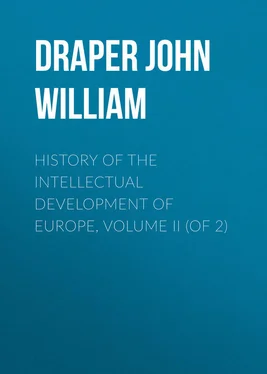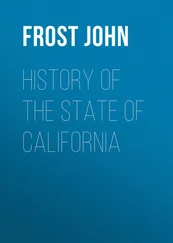John Draper - History of the Intellectual Development of Europe, Volume II (of 2)
Здесь есть возможность читать онлайн «John Draper - History of the Intellectual Development of Europe, Volume II (of 2)» — ознакомительный отрывок электронной книги совершенно бесплатно, а после прочтения отрывка купить полную версию. В некоторых случаях можно слушать аудио, скачать через торрент в формате fb2 и присутствует краткое содержание. Жанр: foreign_antique, foreign_prose, на английском языке. Описание произведения, (предисловие) а так же отзывы посетителей доступны на портале библиотеки ЛибКат.
- Название:History of the Intellectual Development of Europe, Volume II (of 2)
- Автор:
- Жанр:
- Год:неизвестен
- ISBN:нет данных
- Рейтинг книги:4 / 5. Голосов: 1
-
Избранное:Добавить в избранное
- Отзывы:
-
Ваша оценка:
- 80
- 1
- 2
- 3
- 4
- 5
History of the Intellectual Development of Europe, Volume II (of 2): краткое содержание, описание и аннотация
Предлагаем к чтению аннотацию, описание, краткое содержание или предисловие (зависит от того, что написал сам автор книги «History of the Intellectual Development of Europe, Volume II (of 2)»). Если вы не нашли необходимую информацию о книге — напишите в комментариях, мы постараемся отыскать её.
History of the Intellectual Development of Europe, Volume II (of 2) — читать онлайн ознакомительный отрывок
Ниже представлен текст книги, разбитый по страницам. Система сохранения места последней прочитанной страницы, позволяет с удобством читать онлайн бесплатно книгу «History of the Intellectual Development of Europe, Volume II (of 2)», без необходимости каждый раз заново искать на чём Вы остановились. Поставьте закладку, и сможете в любой момент перейти на страницу, на которой закончили чтение.
Интервал:
Закладка:
Pecuniary necessities of Rome.This was the state of affairs at the commencement of the quarrel between Philip and Boniface. The Crusades had brought all Europe under taxation to Rome, and loud complaints were everywhere made against the drain of money into Italy. Things had at last come to such a condition that it was not possible to continue the Crusades without resorting to a taxation of the clergy, and this was the true reason of the eventual lukewarmness, and even opposition to them. But the stream of money that had thus been passing into Italy had engendered habits of luxury and extravagance. Cost what it might, money must be had in Rome. The perennial necessity under which the kings of England and France found themselves – the necessity of revenue for the carrying out of their temporal projects – could only be satisfied in the same way. The wealth of those nations had insensibly glided into the hands of the Church. The King of England compels the clergy to pay taxes.In England, Edward I. enforced the taxation of the clergy. They resisted at first, but that sovereign found an ingenious and effectual remedy. He directed his judges to hear no cause in which an ecclesiastic was a complainant, but to try every suit brought against them; asserting that those who refused to share the burdens of the state had no right to the protection of its laws. They forthwith submitted. In the nature and efficacy of this remedy we for the first time recognize the agency of a class of men soon to rise to power – the lawyers.
The King of France attempts it.In France, Philip the Fair made a similar attempt. It was not to be supposed that Rome would tolerate this trespassing on what she considered her proper domain, and accordingly Boniface issued the bull " Clericis laicos ," excommunicating kings who should levy subsidies on ecclesiastics. Hereupon Philip determined that, if the French clergy were not tributary to him, France should not be tributary to the pope, and issued an edict prohibiting the export of gold and silver from France without his license. But he did not resort to these extreme measures until he had tried others which perhaps he considered less troublesome. He had plundered the Jews, confiscated their property, and expelled them from his dominions. Is abetted by the begging friars,The Church was fairly next in order; and, indeed, the mendicant friars of the lower class, who, as we have seen, were disaffected by the publication of "The Everlasting Gospel," were loud in their denunciations of her wealth, attributing the prevailing religious demoralization to it. They pointed to the example of our Lord and his disciples; and when their antagonists replied that even He condescended to make use of money, the malignant fanatics maintained their doctrines, amid the applause of a jeering populace, by answering that it was not St. Peter, but Judas, who was intrusted with the purse, and that the pope stood in need of the bitter rebuke which Jesus had of old administered to his prototype Peter, saying, "Get thee behind me, Satan; for thou savourest not of the things that be of God, but of the things that be of men" (Mark viii. 33). Under that authority they affirmed that they might stigmatize the great culprit without guilt. So the king ventured to put forth his hand and touch what the Church had, and she cursed him to his face. At first a literary war ensued: the pope published his bull, the king his reply. and ably sustained by the lawyers.Already the policy which Philip was following, and the ability he was displaying, manifested that he had attached to himself that new power of which the King of England had taken advantage – a power soon to become the mortal enemy of the ecclesiastic – the lawyers. Device of the jubilee.In the meantime, money must be had in Rome; when, by the singularly felicitous device of the proclamation of a year of jubilee, A.D. 1300, large sums were again brought into Italy.
The four enemies of Boniface.Boniface had thus four antagonists on his hands – the King of France, the Colonnas, the lawyers, and the mendicants. By the latter, both high and low, he was cordially hated. Thus the higher English Franciscans were enraged against him because he refused to let them hold lands. They attempted to bribe him with 40,000 ducats; but he seized the money at the banker's, under the pretence that it had no owners, as the mendicants were vowed to poverty, and then denied the privilege. As to the lower Franciscans, heresy was fast spreading among them. They were not only infected with the doctrines of "The Everlasting Gospel," but had even descended into the abyss of irreligion one step more by placing St. Francis in the stead of our Saviour. They were incessantly repeating in the ears of the laity that the pope was Anti-Christ, "The Man of Sin." Collision between the French king and the pope.The quarrel between Philip and Boniface was every moment increasing in bitterness. The former seized and imprisoned a papal nuncio, who had been selected because he was known to be personally offensive; the latter retaliated by the issue of bulls protesting against such an outrage, interfering between the king and his French clergy, and citing the latter to appear in Rome and take cognizance of their master's misdoings. The monarch was actually invited to be present and hear his own doom. In the lesser bull – if it be authentic – and the king's rejoinder, both parties seem to have lost their temper. The bull " Ausculta Fili ."This was followed by the celebrated bull " Ausculta Fili " at which the king's indignation knew no bounds. He had it publicly burnt in Paris at the sound of a trumpet; assembled the States-General; and, under the advice of his lawyers, skilfully brought the issue to this: Does the king hold the realm of France of God or of the pope? Without difficulty it might be seen how the French clergy would be compelled to act: since many of them held fiefs of the king, all were in fear of the intrusion of Italian ecclesiastics into the rich benefices. France, therefore, supported her monarch. The bull " Unam Sanctam ."On his side, Boniface, in the bull " Unam Sanctam " asserted his power by declaring that it is necessary to salvation to believe that "every human being is subject to the Pontiff of Rome." Philip, foreseeing the desperate nature of the approaching conflict, and aiming to attach his people firmly to him by putting himself forth as their protector against priestly tyranny, again skilfully appealed to their sentiments by denouncing the Inquisition as an atrocious barbarity, an outrage on human rights, violating all law, resorting to new and unheard-of tortures, and doing deeds at which men's minds revolt with horror. In the South of France this language was thoroughly understood. William de Nogaret.The lawyers, among whom William de Nogaret was conspicuous, ably assisted him; indeed, his whole movement exhibited the extraordinary intelligence of his advisers. It has been affirmed, and is, perhaps, not untrue, that De Nogaret's father had been burnt by the Inquisition. The great lawyer was bent on revenge. Action of the States-General.The States-General, under his suggestions, entertained four propositions: 1. That Boniface was not the true pope; 2. That he was a heretic; 3. That he was a simoniac; 4. That he was a man weighed down with crimes. De Nogaret, learning from the Colonnas how to touch the papacy in a vital point, demanded that the whole subject should be referred to a "General Council" to be summoned by the king. A second meeting of the States-General was held. William de Plaisian, the Lord of Vezenoble, appeared with charges against the pope. Accusations against the pope.Out of a long list, many of which could not possibly be true, some may be mentioned: that Boniface neither believed in the immortality nor incorruptibility of the soul, nor in a life to come, nor in the real presence in the Eucharist; that he did not observe the fasts of the Church – not even Lent; that he spoke of the cardinals, monks, and friars as hypocrites; that the Holy Land had been lost through his fault; that the subsidies for its relief had been embezzled by him; that his holy predecessor, Celestine, through his inhumanity had been brought to death; that he had said that fornication and other obscene practices are no sin; that he was a Sodomite, and had caused clerks to be murdered in his presence; that he had enriched himself by simony; that his nephew's wife had borne him two illegitimate sons. These, with other still more revolting charges, were sworn to upon the Holy Gospels. The king appealed to "a general council and to a legitimate pope."
Читать дальшеИнтервал:
Закладка:
Похожие книги на «History of the Intellectual Development of Europe, Volume II (of 2)»
Представляем Вашему вниманию похожие книги на «History of the Intellectual Development of Europe, Volume II (of 2)» списком для выбора. Мы отобрали схожую по названию и смыслу литературу в надежде предоставить читателям больше вариантов отыскать новые, интересные, ещё непрочитанные произведения.
Обсуждение, отзывы о книге «History of the Intellectual Development of Europe, Volume II (of 2)» и просто собственные мнения читателей. Оставьте ваши комментарии, напишите, что Вы думаете о произведении, его смысле или главных героях. Укажите что конкретно понравилось, а что нет, и почему Вы так считаете.












